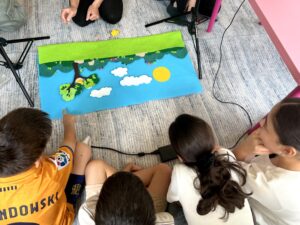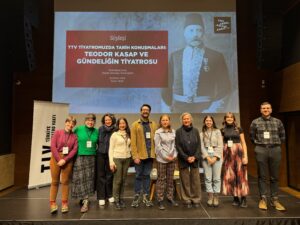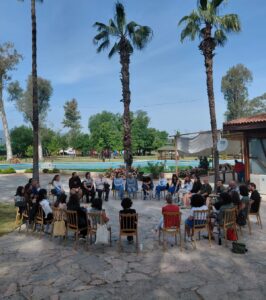The ALS-MND Association Turkey (ALS-MNH Derneği), based in Istanbul, raises awareness about Amyotrophic Lateral Sclerosis (ALS) and other Motor Neuron Diseases (MND), improves patients’ quality of life, supports research, and guides patients and families.
Through the Digital Transformation Fund’s 2025 cycle, implemented in partnership with the Support Foundation for Civil Society and the European Bank for Reconstruction and Development (EBRD), we supported the association to strengthen its communication with patients, families, and donors, renew its website, set up a CRM system, and update its email and SMS strategies.
In our interview, the team shared the challenges they faced during this digital transformation and how new tools will help them support patients and families more effectively.
Living is not just about breathing — it is about living a dignified, quality life.
Can you tell us about your organisation and what you do?
ALS-MND Association Turkey was founded in 2001 by patients, families, and supporters, including the late footballer Sedat Balkanlı (Fenerbahçe) and Ismail Gökçek (Trabzonspor). The association’s mission is to raise awareness among ALS-MND in Türkiye, support patients with medical equipment and guidance, improve the quality of life for patients and families, and promote scientific research.
Since 2012, the association has been recognised as a Public Benefit Association. We represent Türkiye in international networks, run awareness campaigns, host seminars, and engage universities and public institutions.
So far, we have provided scholarships to 343 children whose parents have ALS. Every May, during ALS Awareness Month, we hold fairs, seminars, and symposiums. On World ALS Day (21 June), we organise sponsored events to further raise awareness.
With digital transformation, we aim to create an open-source-ready website for ALS-MND.
Through the Digital Transformation Fund, you aim to reach patients and families more effectively. Why did you need digital transformation, and what challenges did you face?
Our old website was difficult to update. Sharing research news or removing outdated content was challenging, and adding new features was nearly impossible. We needed a mobile-friendly, secure platform with modern tools to communicate efficiently with patients, families, and donors.
The main challenge has been keeping pace with the rapidly evolving digital landscape. Through workshops and mentorship provided with this grant support, we have learned, adapted, and strengthened our skills.
When it’s not possible to add more days to life, we strive to add life to the days.
How will new tools like CRM, email, and SMS improve your support for patients?
We operate with a small team to keep costs low and focus resources on patient care. Digital tools will make our work faster and more efficient, and help new team members get up to speed quickly. Our target audiences include patients, families, healthcare professionals, donors, and potential donors. We aim to reach wider audiences, create an open-source-ready website, and make communication more effective.
We want a platform where patients can register easily, families can request support online, and services can be delivered more efficiently. This will help us respond faster to patients’ needs and improve their quality of life.
How do you raise awareness of a rare disease like ALS?
ALS-MND is a rare disease. In Türkiye, there is an estimated 8,000–10,000 patients, although the exact numbers are unknown to the Ministry of Health or the Rare Diseases Department. Raising awareness and creating resources for such a small population is challenging.
Having a small target population means project applications often report lower reach and impact. We are starting a database project to strengthen our capacity to reach patients and families, communicate effectively, increase awareness, attract donors, and expand our resources.
We act as a bridge between donors and families, striving to improve the quality of life for patients and caregivers.
How would you describe your work to those who want to support you?
ALS is a devastating disease in which patients feel imprisoned in their own bodies. The diagnosis is a huge shock — the global Ice Bucket Challenge highlighted this experience.
With proper medical care, equipment, and support, patients can live meaningful lives for many years. Supporting patients also means providing financial, social, psychological, and emotional support to caregivers and families. Living is not just about breathing — it is about living a dignified, quality life. We act as a bridge between donors and families, striving to improve the quality of life for patients and caregivers.
ALS patients often require 24/7 home care, including ventilators and beds. While they remain mentally alert, they lose physical mobility and may experience speech difficulties. We have shared sustainable home care models with relevant ministries and institutions.
Through our project “Living Means More Than Just Surviving,” we conducted two years of home visits, researching the challenges of patients and caregivers for the first time in Türkiye. The results were shared at a workshop in Ankara and published in a project book.
Since 2001, we have worked to give a voice to patients who cannot speak and connect them to the world. You can see the experiences of patients and families in their own words and videos. As our motto states: “Where there is breath, there is hope…”







